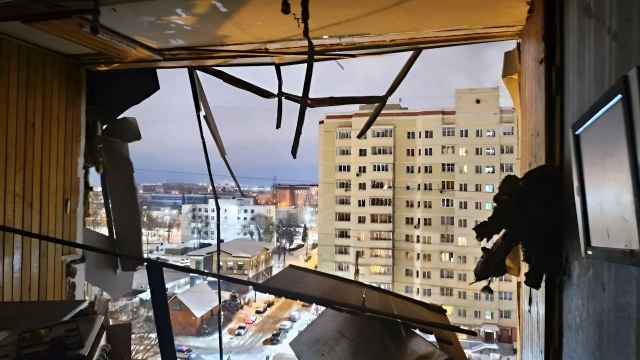The Central Bank on Friday signaled that it had become more concerned about inflation, saying a drought may affect prices until next fall, in what may be the first sign of a shift toward eventual rises in interest rates.
Inflation could reach 8 percent this year, Central Bank Chairman Sergei Ignatyev said in the first major public address by the regulator since a severe drought killed a third of Russia's harvest, pushing up prices for key foods.
"The very unfavorable weather conditions of this summer may have a significant, if time-limited, impact on inflation. By next fall, this impact may be fully exhausted," Ignatyev said.
Ignatyev's prognosis for inflation suggests that the drought's impact on prices is deeper than thought. At the start of September, the Central Bank still had expected 2010 inflation to be about 7 percent.
It also suggests that, if the refinancing rate is not raised from the current record low of 7.75 percent, real rates will dip into negative territory by the year's end, something that the Central Bank previously said it would seek to avoid.
The bank is next due to meet on rates Sept. 28.
"In the current conditions, the chances that the Central Bank may start to increase rates are growing," said Anna Bogdyukevich, an analyst at Gazprombank.
"I do not think that the Central Bank's policy will change next week," Bogdyukevich said. "But in late November or December, it is possible. We think that a hike of 25 basis points is possible this year," she added.
On Friday, Ignatyev made no comment on future interest rates, but he did not repeat the bank's line from late August and early September that rates would likely remain on hold in coming months. Economists have estimated that the prolonged drought, which was accompanied by wildfires that smothered Moscow in smog and burned down thousands of homes in the regions, will knock about a percentage point off economic growth this year. Gross domestic product growth is now expected to be 4 percent after a sharp contraction in 2009.
Any potential rate hikes could help slow the weakness in the ruble, which slumped to multimonth lows last week.
"Among reasons for some ruble weakening, I would name the trend for a smaller current account surplus as a result of fast import growth. In the last few days, speculative factors have played a role," Ignatyev said.
He reiterated that the Central Bank does not have a specific target for the ruble but intervenes to reduce volatility.
"In the last few months, the Central Bank's currency interventions were insignificant," he said, adding that in the first 22 days of September, it had sold about $600 million.
The ruble closed down versus the dollar Friday, coming in at 30.73, or a decrease of 0.8 percent.
A weak ruble could further add to inflationary pressures by pushing up the cost of imports, although such price increases may cool overall demand for the same goods.
On the flip side, the ruble's stabilization during the summer months and a recent reversal may help tame the growth of money supply.
Ignatyev blamed money supply growth on "the large-scale purchases of foreign currency" by the Central Bank earlier this year, which has now reversed because of ruble weakness.
The other liquidity boost ― from the government spending its Reserve Fund to plug the budget deficit ― also has halted.
"The Finance Ministry has started using domestic borrowings more widely to cover the deficit, which we welcome in every way," Ignatyev said.
"Thus, in coming months we expect a slowdown in money supply growth," he said, noting that for now, the fast growth of money supply is adding to inflation risks.
The Central Bank's support for increased government borrowing could be one reason why it delays rate hikes, said Vladimir Osakovsky, an analyst at UniCredit.
The Finance Ministry "is amid aggressive domestic borrowing that's going well, and the government is really vulnerable in this [borrowing] to adverse movements in rates," he said.
Osakovsky said "the next rate movement will be upwards, that's for sure, but that will not happen before 2011 — possibly early 2011."
A Message from The Moscow Times:
Dear readers,
We are facing unprecedented challenges. Russia's Prosecutor General's Office has designated The Moscow Times as an "undesirable" organization, criminalizing our work and putting our staff at risk of prosecution. This follows our earlier unjust labeling as a "foreign agent."
These actions are direct attempts to silence independent journalism in Russia. The authorities claim our work "discredits the decisions of the Russian leadership." We see things differently: we strive to provide accurate, unbiased reporting on Russia.
We, the journalists of The Moscow Times, refuse to be silenced. But to continue our work, we need your help.
Your support, no matter how small, makes a world of difference. If you can, please support us monthly starting from just $2. It's quick to set up, and every contribution makes a significant impact.
By supporting The Moscow Times, you're defending open, independent journalism in the face of repression. Thank you for standing with us.
Remind me later.





